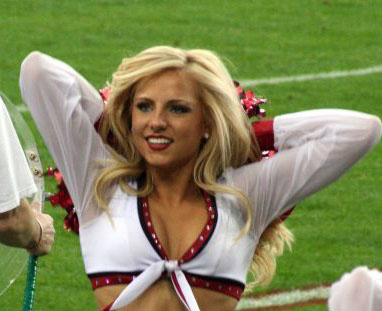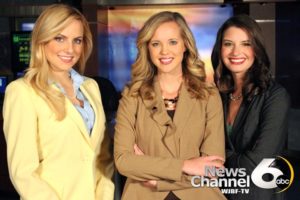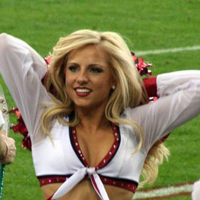As part of our ongoing effort to playfully challenge stereotypes and inspire more girls to consider careers in science, I’d like to introduce you to Jenna. She’s a former Cardinals cheerleader with a passion for meteorology.
SciCheer: Ok, Jenna…why meteorology?
Jenna: It’s somewhat of mystery that I’m a weather broadcaster now! As a kid, science was my least favorite subject. It wasn’t until college that I discovered I was good with–and enjoyed–natural sciences and journalism. I have a degree in Broadcasting from the Walter Cronkite School of Journalism and Mass Communication at Arizona State University. With that degree and some weather training I’m qualified to be a weather forecaster and TV reporter. However most larger TV markets prefer their weather team to have a degree in meteorology and the appropriate weather seals. Since I discovered my love for weather later on in college I decided to finish my journalism degree, get a forecasting job, and then continue my meteorology education when the time was right so that I might be able to pursue a meteorology career.
 S.C.: How’d you get to be a weather forecaster?
S.C.: How’d you get to be a weather forecaster?
Jenna: I originally went into college as a double major in Dance and Business and like most students I changed my area of study several times. Eventually I stuck with a major in broadcasting. At the time my goal was to become a sports sideline reporter. The summer before my senior year I took an internship at WNDU-TV in South Bend, IN. I was told that the sports intern position had already been filled, but I could be a weather intern and still intern with the sports reporters when I had time. I like to say that’s when “I got bit by the weather bug.” I had a wonderful team of meteorologist mentors who opened my eyes to just how awesome weather is. I went back to school that fall and began taking meteorology classes then became the weather forecaster for our school’s live PBS broadcast, Cronkite NewsWatch. After graduation the job search was on and I eventually got an offer from WJBF-TV in Augusta, GA where I work now as a Weekend Weather Forecast and Reporter.
S.C.: Can you describe a typical day at work?
Jenna: I wear two hats at my job. On the weekends I’m a weather forecaster and during the week I’m either filling-in for the other meteorologists or reporting on environmentally related stories. During the week I keep updated on weather trends so that I know what to expect when I go in for the evening forecasts on Saturdays and Sundays. Once I’m at work I gather data from various weather sources and determine my forecast for the next seven days. From there I create my weather graphics for a 6, 10, and 11 o’clock newscasts. Even though I start working at 2:30 in the afternoon, the weather is constantly changing and so I’m constantly updating my data and forecast all the way up to the final minutes before a show. I typically finish up work around midnight, but if there’s severe weather heading our way I stay and track the storm until another meteorologist can relieve me.
S.C.: So, why aren’t we able to predict weather forecasts with 100% accuracy with all the technology we have these days?
Jenna: Weather is a science because it can be observed, tested, and theorized, but it’s not an exact science. There’s actually a lack of technology development for weather forecasting and analysis. Since having an accurate, long-term forecast can help save lives I would love to see more funding to support developing such technologies.
S.C.: What’s one thing you wish more people knew about your career?
Jenna: I don’t read a prompter! The most common question I get is, “So, how is it reading the weather off of that prompter?” No prompter. I setup my weather forecast, make sure I understand how the weather systems are going to play out for the next few days, then on live TV tell my viewers the “story” about the upcoming weather.
 S.C.: Ok, let’s talk about your “other” life. When did you cheer for the Cardinals?
S.C.: Ok, let’s talk about your “other” life. When did you cheer for the Cardinals?
Jenna: 2008 into 2009 when the Arizona Cardinals made it to Super Bowl XLIII.
S.C.: Did being a cheerleader help or hinder your career aspirations?
Jenna: I’ve had mixed reactions from people. In my initial job search I had “NFL Cheerleader” on my résumé. Most reactions I received fell under two categories. There were those who were interested in that fact and couldn’t stop asking me questions about my NFL experience. Then there were others who would raise their eyebrows and, it seemed to me, pin me in as a blonde bimbo right off the bat. Both reactions were a distraction to my ultimate goal of a career in a science field. Eventually I took the extracurricular off of my résumé and allowed people to get to know who I was as a person before I told them about being a professional cheerleader.
S.C.: What advice would you give your 12-year-old self?
Jenna: Thinking back to when I was twelve I was scared and lonely. Middle school was a tough time for me. But if 12-year-old Jenna could see me now I know she would have the confidence to walk tall and know that she’s on the right path.
S.C.: What are your plans for the future?
Jenna: Once I receive my meteorology degree and seals I plan to work as a broadcast meteorologist. I’d like to live in Chicago or New York City as either a top market or network meteorologist.
S.C.: Best cheerleading experience?
Jenna: Visiting and performing for the American troops in Australia was one of the best cheerleading experiences I’ve had. After one of our performances in Alice Springs the cheer team piled into our transport van and we headed home for the night. One of the generals stopped our car before we made it on the road. We opened the door to see this big, burley man in tears. He told us how much he and the troops and families appreciated our time there. He said our performances brought them joy and we made them feel at home when we took the time to sit aside and chat with them. What an amazing experience to bring about such emotion from a truly touched person.
S.C.: Best science-related experience?
Jenna: Tracking my first severe thunderstorm on live television was my best science-related experience. Once severe weather strikes people need to know where it’s at, what it’s doing, and where it’s going next. Tracking severe weather ignites a fire in my veins and it’s very fast-paced. My first storm track was a little rough, but I had my chief meteorologist there with me to make sure I didn’t miss any of the important facts. Once I got off the air the Chief looked at me and said, “You were just on-air for 45 minutes. You did well.” “Forty-five minutes?!” I said, “It felt like five!”


Cool story. Welcome to Science Cheerleader, Jenna! You’ll find we’re all friendly here.
/b
This is great! I often wish I was a meteorologist. 🙂
Congradulations Jenna! I’m sure you’ll do great.
Thanks everyone! Glad to be a part of the Science Cheerleaders! @
cheerontheguys @
jhoomerOmar @
SciSeekFeed @scicheer http://bit.ly/kSQNuB